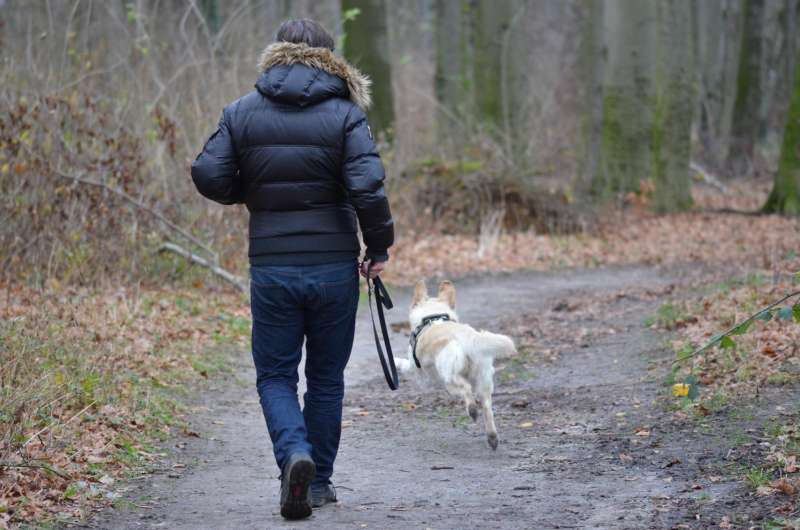October 25, 2017 report
Like humans, dogs found to have fitful sleep after negative experiences

A team of researchers from several institutions in Hungary has found that dogs, like humans, very often have sleep problems after experiencing emotional difficulties. In their paper published in Proceedings of the Royal Society B, the group describes their study of sleeping dogs and what they found.
Most people know by experience that stressful days can lead to sleepless nights, but little work has been done, the researchers note, to find out if the same is true for other animals. In this new effort, they sought to learn more by recording brain waves of sleeping dogs.
To find out if sleep patterns in dogs change due to stressful situations prior to sleeping, the researchers enlisted the assistance of 16 pet dogs of different breeds and their owners. Each of the dogs was subjected to either a positive or negative experience. A positive experience was something the dog was known to like, such as being petted or engaging in playing catch. Negative experiences included being tied to a door for a length of time while being ignored by the owner or having a researcher stare threateningly directly into its eyes.
All of the dogs were fitted with EEG sensors, and after their positive or negative experiences, were allowed to go to a designated place to sleep.
The researchers report that the dogs that had experienced a stressful event went to sleep approximately twice as fast as the relaxed dogs, a behavior that has been seen before. Prior research suggests dogs attempt to separate themselves as quickly as possible from their stressful feelings. All of the dogs were allowed to sleep up to three hours as researchers monitored their brain waves. The researchers found that those dogs that had undergone negative experiences spent on average 20 fewer minutes of deep sleep than the dogs that had positive experiences. They did not spend it awake, however, instead, they simply had more minutes of REM sleep.
The researchers suggest that a single bad night for a dog is not likely to cause much of a problem, but if negative experiences occur regularly, it could spell trouble—past studies have shown that dogs, like humans, retain knowledge better when they get a good night's sleep.
More information: Anna Kis et al. Sleep macrostructure is modulated by positive and negative social experience in adult pet dogs, Proceedings of the Royal Society B: Biological Sciences (2017). DOI: 10.1098/rspb.2017.1883
Abstract
The effects of emotionally valenced events on sleep physiology are well studied in humans and laboratory rodents. However, little is known about these effects in other species, despite the fact that several sleep characteristics differ across species and thus limit the generalizability of such findings. Here we studied the effect of positive and negative social experiences on sleep macrostructure in dogs, a species proven to be a good model of human social cognition. A non-invasive polysomnography method was used to collect data from pet dogs (n = 16) participating in 3-hour-long sleep occasions. Before sleep, dogs were exposed to emotionally positive or negative social interactions (PSI or NSI) in a within-subject design. PSI consisted of petting and ball play, while NSI was a mixture of separation, threatening approach and still face test. Sleep macrostructure was markedly different between pre-treatment conditions, with a shorter sleep latency after NSI and a redistribution of the time spent in the different sleep stages. Dogs' behaviour during pre-treatments was related to the macrostructural difference between the two occasions, and was further modulated by individual variability in personality. This result provides the first direct evidence that emotional stimuli affect subsequent sleep physiology in dogs.
Journal information: Proceedings of the Royal Society B
© 2017 Phys.org



















